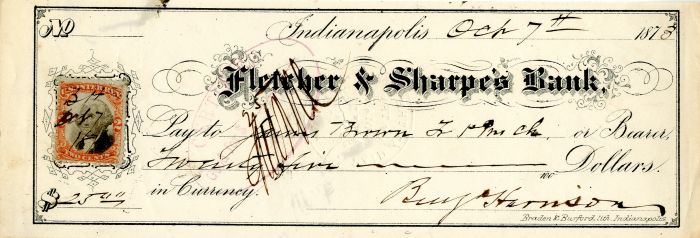Benjamin Harrison signed Check
Inv# AU1486 Check
Check signed by Benjamin Harrison.

Benjamin Harrison (August 20, 1833 – March 13, 1901) was the 23rd President of the United States (1889–1893). Harrison, a grandson of President William Henry Harrison, was born in North Bend, Ohio, and moved to Indianapolis, Indiana, at age 21, eventually becoming a prominent politician there. During the American Civil War, he served the Union as a Brigadier General in the XX Corps of the Army of the Cumberland. After the war he unsuccessfully ran for the governorship of Indiana, and was later elected to the U.S. Senate by the Indiana legislature.
At the outbreak of the Civil War, Harrison wished to join the Union Army, but initially resisted, as he was concerned that his young family would need his financial support. In 1862, President Abraham Lincoln issued a call for more recruits. While visiting Governor Oliver Morton, Harrison found him distressed over the shortage of men answering the latest call. Harrison told the governor, "If I can be of any service, I will go". Morton then asked Harrison if he could help to recruit a regiment, though he would not ask him to serve. Harrison proceeded to raise a regiment, recruiting throughout northern Indiana. Morton offered its command to Harrison, but he declined because of his lack of military experience, and instead was commissioned as a second lieutenant. In August 1862, when the regiment left Indiana to join the Union Army at Louisville, Kentucky, Harrison was promoted by Morton to the rank of colonel, and his regiment was commissioned as the 70th Indiana Infantry.
The 70th Indiana spent most of its first two years of service performing reconnaissance duty and guarding railroads in Kentucky and Tennessee. In 1864, Harrison and his regiment joined William T. Sherman's Atlanta Campaign and moved to the front lines. On January 2, 1864, Harrison was promoted to command the 1st Brigade of the 1st Division of the XX Corps. He commanded the brigade at the Battles of Resaca, Cassville, New Hope Church, Lost Mountain, Kennesaw Mountain, Marietta, Peachtree Creek and Atlanta. When Sherman's main force made its March to the Sea, Harrison's brigade was transferred to the District of Etowah and participated in the Battle of Nashville. On March 22, 1865, Harrison earned his final promotion, to the rank of brigadier general, and marched in the Grand Review in Washington, D.C. before mustering out of the army on June 8, 1865.
Harrison, a Republican, was elected to the presidency in 1888, defeating Democratic incumbent Grover Cleveland. His administration is most remembered for economic legislation, including the McKinley Tariff and the Sherman Antitrust Act, and for annual federal spending that reached one billion dollars for the first time. Democrats attacked the "Billion Dollar Congress", and used the issue, along with the growing unpopularity of the high tariff, to defeat the Republicans, both in the 1890 mid-term elections and in Harrison's bid for re-election in 1892. Harrison advocated, although unsuccessfully, for federal education funding and legislation to protect voting rights for African Americans. He also saw the admittance of six states into the Union.
Defeated by Cleveland in his bid for re-election in 1892, Harrison returned to private life in Indianapolis. He later represented the Republic of Venezuela in an international case against the United Kingdom. In 1900, he traveled to Europe as part of the case and, after a brief stay, returned to Indianapolis, where he died the following year from complications arising from influenza. He is to date the only U.S. president from Indiana and the only one to be the grandson of another president.










Ebay ID: labarre_galleries